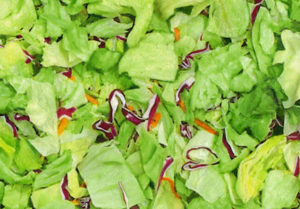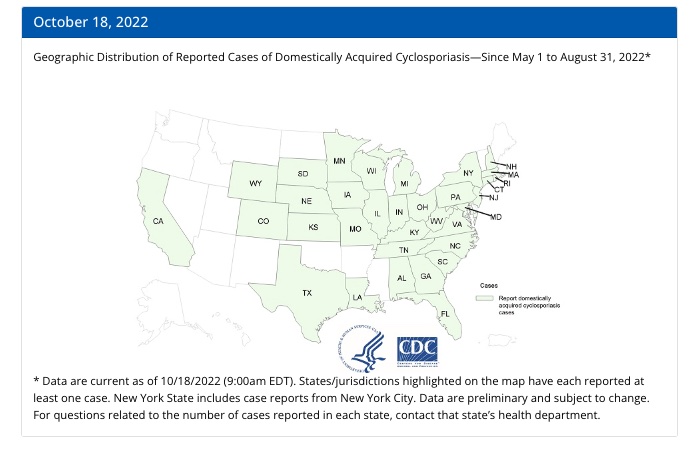Updated October 27 with final information Leafy greens were the suspected source of two Cyclospora outbreaks that sickened at least 127 people over the summer, according to the U.S. Food and Drug Administration (FDA). Outbreaks linked to Cyclospora, a parasite native to tropical climates, are frequently associated with imported fresh produce and leafy greens. In 2020, 701 people were part of a Cyclospora outbreak linked to Fresh Express salads.
During interviews with health officials, outbreak patients are asked about the foods they ate in the weeks before becoming ill. Many of the patients sickened in these outbreaks must have named leafy greens such as bagged salads. Some likely mentioned the same brand because the FDA was able to conduct traceback investigations, tracing the journey of the leafy greens from the point of purchase back to the field where they were grown.
However, the FDA was unable to identify the specific company or companies that produced the tainted greens “due to the lack of additional detail in the epidemiological data and the absence of supporting evidence collected from traceback and sample collection,” the agency stated in its final update.
Contact Pritzker Hageman Cyclospora Lawyers for a free consultation.
Phone: 888-377-8900 | Text: 612-261-0856
Contact our Cyclospora Food Safety Lawyers Online
What is Cyclospora?

Humans are the only known reservoirs for Cyclospora, a parasite native to tropical climates. Infections occur when people consume food or water contaminated with human feces containing the parasite. In the U.S. and Canada, non-travel-related cases are often linked to imported produce. Previous Cyclospora outbreaks have been linked to salad, vegetables, herbs, and berries. Most Cyclospora illnesses occur between the months of May and August.
Symptoms of a Cyclospora infection include diarrhea that is often described as explosive and watery, abdominal cramps, bloating, nausea, loss of appetite, weight loss, and fatigue. These symptoms can appear within 1 to 14 days of exposure.
Untreated, symptoms of a Cyclospora infection can last for months. Doctors usually prescribe the antibiotic combination Trimethoprim/sulfamethoxazole, sold under the brand names Bactrim, Septra, and Cotrim to treat cyclosporiasis. There isn’t an effective antibiotic regimen for patients with sulfa allergies.
Unlike food poisoning caused by bacterial pathogens, there isn’t a whole genome sequencing test that can identify the genetic fingerprint of Cyclospora. So, outbreaks are identified by gathering food histories of people sickened.
Non-travel-related Cyclospora cases in the U.S.
Cyclospora used to be primarily associated with travel to underdeveloped countries. But when the parasite began to be regularly linked to imported produce, the CDC began reporting non-travel-related cases. The current outbreaks are subsets of these cases.
Between May 1, 2022, and October 18, 2022, health officials from 33 states reported a total of 1,129 cases of cyclosporiasis and 74 hospitalizations, according to a report from the Centers for Disease Control and Prevention (CDC). In Canada, public health officials reported 208 such cases and 10 hospitalizations through July 27. The Canadian cases were reported from three provinces: British Columbia (3), Ontario (191), and Quebec (14).

Experienced Cyclospora Lawyers
Pritzker Hageman Cyclospora lawyers have represented clients sickened in every major Cyclospora outbreak in the U.S. To request a free consultation about your potential case, please call 1-888-377-8900, text 612-261-0856, or complete the form below.